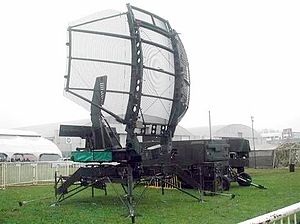
Summary
The AN/TPS-43 is a transportable air search 3D radar produced in the United States originally by Westinghouse Defense and Electronic Division, which was later purchased by Northrop-Grumman. It is used primarily for early warning and tactical control, often for control over an associated surface-to-air missile battery or airfield. It is designed to be transported in two M35 cargo trucks and easily air-transportable on two pallets.

The TPS-43 uses multiple feed horns and an organ-pipe scanner to rapidly scan its pencil beam vertically while the entire antenna system rotates to scan in azimuth. By comparing the relative power of a return in one or more of the vertical feed horns, the target altitude can be determined. Since its introduction in 1966 it has undergone many modifications. In later versions, the organ-pipe was replaced by a stripline matrix to produce beamforming that had the same output pattern but had no moving parts. Many more upgrades were made to the transmitter and receiver as solid state electronics were able to handle increased power loads.
Among its notable uses were two examples used by the Argentine Air Force that were moved to the Falkland Islands during the 1982 Falklands War. The example at Port Stanley Airport survived two attacks by AGM-45 Shrike missiles before being captured by British forces. It was repaired, upgraded, and then used by the Royal Air Force for many years.
Description edit
The AN/TPS-43 is a ground-based, non-fixed (i.e.: transportable) search radar.[n 1][1] The entire system can be broken down and packed into two M35 trucks for road transport.
An updated version replacing the original shaped reflector and organ-pipe scanner with a phased array antenna was originally known as the TPS-43E2, but emerged as a much more modern system and was renamed the AN/TPS-75. TPS-75 is the current transportable air control and warning (AC&W) radar used by the United States Air Force.[citation needed]
Variants edit
In addition to the basic TPS-43 several variants were developed.[2]
- TPS-43A (antenna tilt; new IFF)
- TPS-43B (enlarged shelter; changes to transmitter)
- TPS-43C / 43CX (increased reliability; IFF improvements)
- TPS-43D / 43DX (ISLS added; maximum detection range increased)
- TPS-43E (major redesign; improvements to electronics, mechanics and shelter)
- TPS-43F / subvariants V1 to V6 (major redesign; enlarged shelter, improved electronics; increased reliability)
- TPS-43G (4MW version designed for Pakistan)[3]
- TPS-43M (improved electronics; increased dynamic range; improved IFF incorporating several modules in a single unit)
- TPS-430
Operational history edit
The AN/TPS-43 completed development in 1963 and entered US service in 1968.[citation needed]
This radar was deployed by the Argentine Air Force during the 1982 Falklands War to Stanley and survived two British attacks with AGM-45 Shrike anti radar missiles on May 31 and June 3.[4] One of the radars was captured by British forces after the Argentine surrender and deployed at RAF Buchan.[5] Another set installed at Rio Grande, in the mainland, was used to guide Argentine attacks on the British fleet.[6]
Users edit
- Argentine Air Force - In the early 1980s six sets were purchased, one was lost in the Falklands War.[7]
- Bangladesh Air Force - 4 (Status Uncertain) [8]
- Spanish Air and Space Force[9]
Specifications edit
- Weight (including shelter): < 3400 kg
- Frequency range: 2.9 to 3.1 GHz (S-Band)
- Pulse repetition frequency: Fixed: 250 Hz, Staggered: Six PRF's around 250 Hz
- Pulse width: 6.5 microseconds
- Peak power: 4.0 MW
- Average power: 6.7 KW
- Beam width (horizontal): 1.1 degrees
- Beam width (vertical): 1.5 to 8.1 degrees; total 20 degree coverage; six stacked beams
- Antenna rotation rate: 6 rpm
- Maximum range 240 NM
- Maximum display range: 450 km
- Types of cooling : 4 types of cooling use (Air, Gas, Oil and Water)[10]
- Antenna characteristics: Reflector aperture 14 ft (4.27 m) high by 20 ft 4 in (6.20 m) wide
See also edit
Footnotes edit
- ^ The US Military description for radar type TPS is "Ground, Transportable; Radar; Detecting, Range and Bearing, Search".
References edit
Notes edit
- ^ "radar_types". mobileradar.org.
- ^ "radar_descptn_3". mobileradar.org.
- ^ "Pakdef.org: Pakistan Air Defence Ground Environment System". Archived from the original on 2017-05-24. Retrieved 2017-06-03.
- ^ Vulcan: God of Fire, p.(TBC), The History Press (2012).
- ^ "Subbrit:RSG: Sites: RAF Buchan: (former, ROTOR R3 GCI Radar Station 'GBU')". subbrit.org.uk.
- ^ Exocet Falklands: The Untold Story of Special Forces Operations, p.82, Pen and Sword (2014).
- ^ Medio siglo de gastos para la Defensa y la Seguridad en Argentina (1976-2006)- 2da. Parte Centro de Estudios Nueva Mayoría (2007) Archived 2016-03-04 at the Wayback Machine (accessed 2015-01-02)
- ^ Trade Registers Archived 14 April 2010 at the Wayback Machine. Armstrade.sipri.org. Retrieved 23 December 2017.
- ^ "The AN/TPS-43M radar of the Mobile Air Control Group reaches 1,000 operational hours in the area of operations - EMAD". emad.defensa.gob.es. Retrieved 2023-10-17.
- ^ "Radar Basics". radartutorial.eu. Archived from the original on 2007-10-09. Retrieved 2006-08-04.
Sources edit
- radartutorial.eu Card Index of Radar Sets - Ancient Radars – AN/TPS-43 Archived 2007-10-09 at the Wayback Machine
- Mobile Military Radar website, Radar descriptions page, AN/TPS-43 details (accessed 2015-01-02)
- Osacar, Ignacio J. (5 June 2007). "Medio siglo de gastos para la Defensa y la Seguridad en Argentina (1976-2006)- 2da. Parte". NuevaMayoria.com (in Spanish). Buenos Aires, Argentina: Centro de Estudios Nueva Mayoría. Archived from the original on 4 March 2016. Retrieved 2 January 2015.
- Southby-Tailyour, Ewen (2014). Exocet Falklands: The Untold Story of Special Forces Operations. Pen and Sword. ISBN 9781783463879.
- McLelland, Tim (2012). Vulcan: God of Fire. The History Press. ISBN 9780752476957.
External links edit
- "Armamento - Material Terrestre - Sistema de Radares Westinghouse AN-TPS43 y W-430". Fuerza Aérea Argentina (sitio oficial) (in Spanish). Buenos Aires, Argentina: Fuerza Aérea Argentina (Argentine Air Force). Archived from the original on 24 September 2015. Retrieved 6 January 2015.


